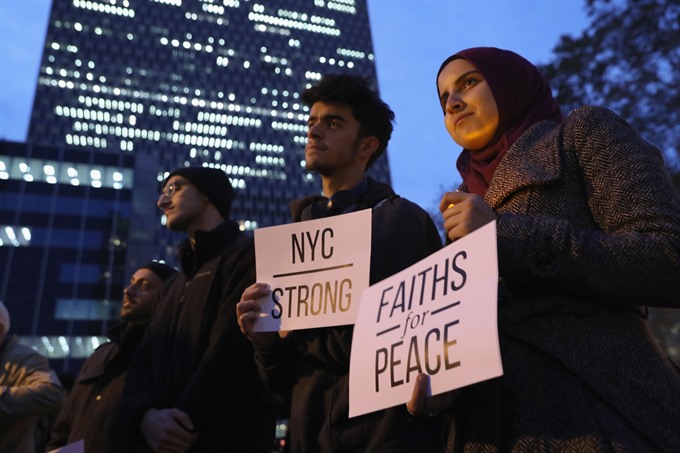 World
World

President Donald Trump on Wednesday vowed a battery of tough measures to curb immigration after a deadly terror attack in New York, but left the White House scrambling to figure out how to fulfil his promises.
 |
| People take part in a vigil for those killed the day before on November 1, 2017 in New York City. The Council on American-Islamic Relations organised the event a day after the attack in lower Manhattan that killed eight people. — AFP/VNA Photo |
WASHINGTON — President Donald Trump on Wednesday vowed a battery of tough measures to curb immigration after a deadly terror attack in New York, but left the White House scrambling to figure out how to fulfil his promises.
Looking to burnish his hardline image after what appeared to be the first major jihadist attack on the homeland during his administration, Trump pledged sweeping reform.
Surrounded by the cabinet, Trump - who ran for the White House on a promise to end what he called "radical Islamic terrorism" - announced he was "starting the process of terminating" America’s green card lottery.
"Diversity lottery. Diversity lottery. Sounds nice. It’s not nice," he said. "We’re so politically correct that we’re afraid to do anything."
The programme was created 27 years ago and awards US permanent resident visas to around 50,000 applicants from around the world each year.
According to Trump, 29-year-old Sayfullo Saipov, identified by authorities as the man who plowed a rented truck into cyclists and pedestrians on a New York City bike path Tuesday, came to the country via the programme in 2010.
Trump also floated deep changes to how terror suspects are prosecuted and said he would consider sending Saipov to Guantanamo Bay, the US military detention centre which holds suspected foreign jihadists in Cuba.
"(We) have to come up with punishment that’s far quicker and far greater than the punishment these animals are getting right now," Trump said.
But the White House was forced to walk back some of his comments, stressing that he was not taking executive action but looking to Congress to change decades old laws.
"We’re going to continue pushing for and advocating for getting rid of this program," press secretary Sarah Huckabee Sanders said of the green card lottery.
Sanders also ruled out executive action to introduce "quicker" and "greater" punishment for those guilty of terror offenses.
"I believe he was voicing his frustration with the lengthy process that often comes with a case like this," Sanders said.
And just hours after Trump and the White House suggested declaring Saipov an "enemy combatant" - opening the possibility of detention without charge and possible dispatch to Guantanamo, that idea was also undercut.
Prosecutors in New York quickly announced two initial charges against Saipov: provision of material support and resources to a designated foreign terrorist organisation, and violence and destruction of motor vehicles.
Saipov, 29, who was arrested after being shot by police, planned for weeks to undertake his attack in the name of Islamic State, following online instructions from the jihadist group, officials said.
New York Governor Andrew Cuomo said he was "radicalised domestically" only after he came to the country, "when he started to become informed about ISIS and radical Islamic tactics."
Closing doors to immigration
Trump ran for election last year promising a crackdown on immigration, including building a wall on the Mexican border and banning Muslim immigrants.
This year he has already slashed the country’s annual refugee intake by more than 50 per cent to 45,000, tightened visa issuance around the world and ordered a ban on travelers from 11 unnamed "high-risk" countries.
Refugee experts say all but one have Muslim-majority populations; they do not include Uzbekistan.
The officially titled Diversity Lottery Program aims to diversify the origins of people granted permanent residence - so-called green cards - in the United States.
In 2015, lottery applications were received from more than 14 million people, of whom 49,377 won green cards, including 2,524 Uzbeks.
Trump said he wants to move US immigration to a "merit-based system" and not allow immigrants to bring their extended families.
Republicans in Congress have tried for several years to eliminate the visa lottery programme, but were stifled by Democratic resistance.
Trump blamed the programme on Chuck Schumer, the senior Democratic senator from New York, even though it was resoundingly supported by both parties and signed into law in 1990 by a Republican president, George HW Bush.
Few US attacks by immigrants
Tuesday’s incident was the second time the lottery has been tied to a jihadist attack inside the United States.
In July 2002, an Egyptian man whose wife entered the country on the green card programme shot two people dead at the ticket counter for El Al, the Israeli airline. — AFP




